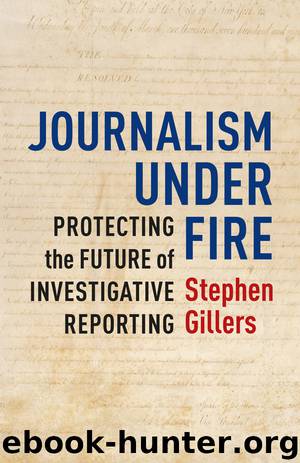Journalism Under Fire by Stephen Gillers

Author:Stephen Gillers
Language: eng
Format: epub, mobi
Publisher: Columbia University Press
A NEWSWORTHINESS EXCEPTION TO GENERALLY APPLICABLE LAWS
How Would It Work?
In Food Lion, we have a model for cases in which subjects of an investigative story seek compensation, either for the conduct that enabled the reporter to learn the information, for the harm caused by the publication of that information, or for both. (Usually both, because if you’re going to sue, you might as well sue on all plausible claims and for all damages possibly available.) Variations from this model are several.
First, the theory of liability may vary. In Food Lion, the court found trespass and disloyalty. But if a reporter does not enter a physical space that belongs to another, trespass is unavailable. If she did not get her story by impersonating a job applicant while working for someone else, a disloyalty claim is unavailable. But trespass and disloyalty do not exhaust the available reasons for liability. Others are intrusion, invasion of privacy, deception, and unlawful recording. These may be combined. Liability in these cases is usually governed by state law. For investigative reporting, the critical question is: When will the First Amendment block liability under these state laws even though they are laws that purportedly apply to everyone?
Second, the space or interest invaded may vary. In a California case, a television station reporting on responses to highway accidents intruded on a conversation between medical personnel and a woman pinned under a car. The station wired a nurse who was treating the woman. After transfer to a helicopter ambulance, it recorded the woman’s voice and image in the helicopter. The California Supreme Court ruled that this conduct would constitute intrusion if, on remand, the jury concluded that it was “highly offensive” unless it was “justified by the legitimate motive of gathering the news.”26 In yet another case, a television reporter, misrepresenting her credentials, got a job at a company that offered “telepsychic” readings to customers who called a 900 telephone number (and were charged by the minute for the duration of the call). The reporter secretly audio and video recorded her conversations with other telepsychics, including Mark Sanders. She then included excerpts of the recordings in a broadcast about the telepsychic industry. The California Supreme Court wrote that although Sanders had no expectation of privacy in his conversations, which other employees could overhear and which the reporter was free to repeat, he did have a reasonable expectation that the conversations would not be recorded. But as before, the court wrote that a newsgathering motive might offer a defense.27
Into this stew we must add one other highly consequential Supreme Court opinion. In Bartnicki v. Vopper, two union officials sued a radio station and others.28 The station had broadcast a surreptitious recording of a telephone call between the union officials. The person who made the recording was not known. The tape made its way to the station, which had done nothing unlawful to get it. The union officials’ conversation was newsworthy for two reasons: Its subject was a local labor dispute between
Download
This site does not store any files on its server. We only index and link to content provided by other sites. Please contact the content providers to delete copyright contents if any and email us, we'll remove relevant links or contents immediately.
| Anthropology | Archaeology |
| Philosophy | Politics & Government |
| Social Sciences | Sociology |
| Women's Studies |
The Secret History by Donna Tartt(19035)
The Social Justice Warrior Handbook by Lisa De Pasquale(12183)
Thirteen Reasons Why by Jay Asher(8885)
This Is How You Lose Her by Junot Diaz(6873)
Weapons of Math Destruction by Cathy O'Neil(6261)
Zero to One by Peter Thiel(5784)
Beartown by Fredrik Backman(5734)
The Myth of the Strong Leader by Archie Brown(5495)
The Fire Next Time by James Baldwin(5428)
How Democracies Die by Steven Levitsky & Daniel Ziblatt(5211)
Promise Me, Dad by Joe Biden(5141)
Stone's Rules by Roger Stone(5080)
A Higher Loyalty: Truth, Lies, and Leadership by James Comey(4947)
100 Deadly Skills by Clint Emerson(4917)
Rise and Kill First by Ronen Bergman(4776)
Secrecy World by Jake Bernstein(4739)
The David Icke Guide to the Global Conspiracy (and how to end it) by David Icke(4697)
The Farm by Tom Rob Smith(4501)
The Doomsday Machine by Daniel Ellsberg(4482)
